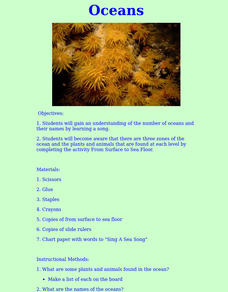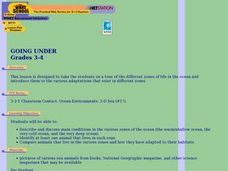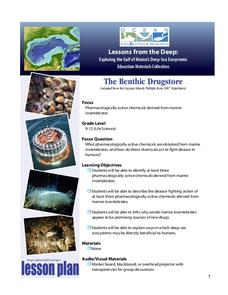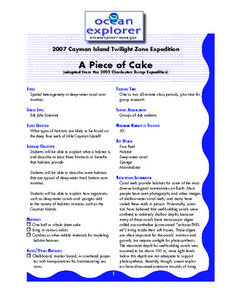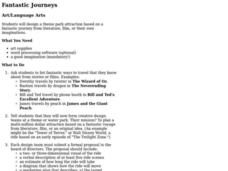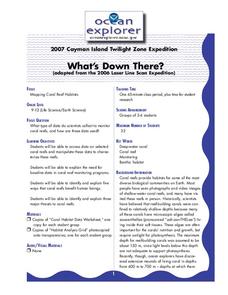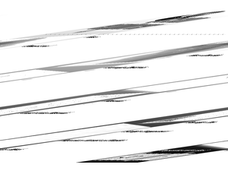NOAA
Deep-Sea Ecosystems – Entering the Twilight Zone
Imagine an ecosystem without any light or oxygen, where living things convert carbon dioxide into food. This ecosystem is thriving and might just be the largest ecosystem on our planet, yet we know very little about it. The instructional...
Curated OER
Entering the Twilight Zone
Students describe major features of cold-seep communities and the process of chemosynthesis as it relates to organisms in each habitat. In this deep-sea habitats instructional activity, students study the categorization of ocean...
Curated OER
Entering The Twilight Zone
In this lesson sixth grade young scholars get into groups and research a given ocean habitat. The major features of cold-seep communities are the objective but plenty information is given about other habitats which could be assigned to...
NOAA
Fishy Deep-sea Designs!
Oceans represent more than 80 percent of all habitats, yet we know less about them than most other habitats on the planet. The instructor introduces the epipelagic, mesopelagic, bathypelagic, twilight, and midnight zones in the ocean....
Curated OER
Entering the Twilight Zone
Students describe major features of cold seep communities and list organisms that are found in these communities. For this water habitat lesson students examine trophic levels, describe the process of chemosynthesis and list the...
Curated OER
Depth Line
Students use adding machine tape to plot increasing ocean depths and deep sea historical events.
Curated OER
In The Zone
Third graders identify ways that ocean animals grow, survive, reproduce, and adapt. They use computer Internet skills to acces and collect information. They create a PowerPoint presentation. They demonstrate writing skills throughthe...
Curated OER
Oceans
Students gain an understanding of the number of oceans and their names by learning a song. They become aware that there are three zones of the ocean and explore the plants and animals that are found at each level.
Curated OER
What's Deep in the Ocean?
Students examine the role of an oceanographer in trying to explore the ocean. Using wax paper, they divide it up to show the sunlight, twilight and midnight zones. To end the lesson, they identify the types of plants and animals that are...
NOAA
Importance of Deep-Sea Ecosystems – The Benthic Drugstore
You never know what you will find next in the deep sea ecosystem. So far, scientists have found items that work as anti-tumor agents, anti-inflammatory agents, agents that stop uncontrolled cell division, and much more. The lesson begins...
Curated OER
A Piece of Cake: Ocean Communities
Students explain habitats. In this model based lesson students create a model to help describe a habitat that is typical of deep-water. Students will describe how organisms such as coral and sponges add to their habitat.
Curated OER
Deep Gardens
Students compare and contrast deep-sea coral reefs with shallow-water coral reefs. In this underwater ecology lesson, students describe three types of coral and explain why scientists are concerned about the future of deep-sea coral.
Curated OER
Now Take a Deep Breath
Students research to answer questions related to deep sea diving. In this deep sea diving instructional activity, students answer questions on a worksheet using the Internet. They discuss pressure, gas laws, and the physiology of diving...
Curated OER
The Benthic Drugstore
High schoolers examine active chemicals that are in marine invertebrates and how they act to fight diseases. In this marine lesson students identify three pharmacologically-active chemicals, describe their disease fighting action and...
Curated OER
Treasures in Jeopardy
Students compare and contrast deep sea coral reefs to shallow water reefs. In this coral reef lesson students develop a poster that could be used to educate the public about the importance of coral reefs.
Curated OER
Let's Go to the Video Tape!
Students examine biological diversity and see how it relates to the concepts of variety and relative abundance. In this investigative lesson plan students view a video on biodiversity and complete an activity.
Curated OER
Watch the Screen!
Students explore screening processes for biological activity. In this deep sea lesson students complete a lab activity.
Curated OER
Fantastic Journeys
Learners design a theme park attraction based on a fantastic journey from literature, film, or their own imaginations. They plan a multi-million dollar attraction based on a fantastic voyage from popular culture entertainment.
Curated OER
Science 911: Car Crash Testing
Learners explore, experiment and analyze the concept of using dummies in a car crash test. They collaborate in a series of tests designed to simulate what really happens in a two-car collision. Each student incorporates probability,...
Curated OER
What's Down There?
High schoolers analyze data on coral reefs and use this to help characterize reefs. In this mapping coral reefs lesson students identify and explain the major threats to coral reefs.
Curated OER
Now, Take a Deep Breath
Students define several laws of pressure and see how they relate to scuba diving. In this ocean explorer lesson students answer questions and complete an activity.
Curated OER
Cavern Life: The Food Web
Students explain the importance of elements on a food web. They realize that without light there can be no life. They perform various activities based on grade level.
Curated OER
What's Bright Red and Invisible?
Students study that very little sunlight penetrates the ocean below depths of 200 meters. They study that no light penetrates the ocean below depths of 1000 meters. They study that the quality of light changes as depth increase









